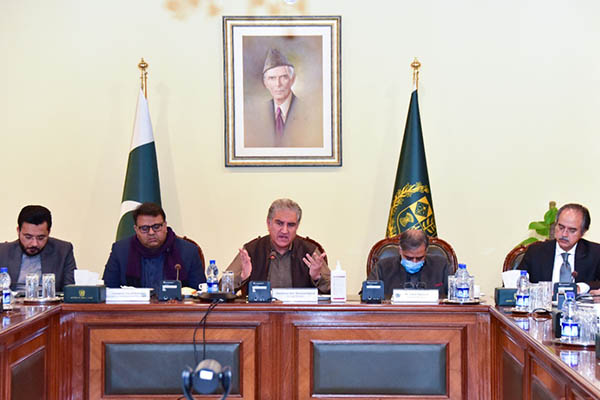
Photo courtesy Foreign Office
Foreign minister claims Pakistan wants to prevent humanitarian crisis and improve lives of Afghan people
This weekend’s meeting of the foreign ministers of Organization of Islamic Cooperation (OIC) in Islamabad is intended to bridge the existing communication gap between the international community and the Taliban, Foreign Minister Shah Mahmood Qureshi said on Thursday.
Addressing a press conference alongside Information Minister Chaudhry Fawad Hussain, he said this meeting would allow members of the international community to sit with the new rulers of Afghanistan, adding this would hopefully prove a stepping stone for finding solutions to the ongoing humanitarian crisis in the war-torn state.
Confirming that a Taliban delegation, headed by Afghanistan’s interim foreign minister, would participate in the moot alongside special representatives from the U.S., Russia and China, he claimed that the South Asian region would benefit if the situation meeting proved fruitful. Representatives of Germany, Canada, Australia and Japan have also been invited, he added. The information minister said 22 foreign ministers from OIC states; and eight senior officials and other representatives of the member countries had thus far confirmed their participation in the conference.
Qureshi said Pakistan wanted the Taliban to listen to the concerns of the international community regarding human rights in Afghanistan. Stressing that Pakistan was not the spokesperson for the Taliban, he said it only wished to bring all stakeholders to the OIC platform to enable direct communication.
The foreign minister said Pakistan’s focus was improving the lives of the Afghan people who had faced conflict for decades. “We are not limiting ourselves to any particular faction or group in Afghanistan,” he claimed and dismissed the impression that the OIC moot was a step toward recognizing the Taliban regime.
Qureshi said the upcoming meeting—scheduled to begin on Dec. 19—offered a rare opportunity for peace and stability in Afghanistan. If the situation in the neighboring state does not improve, he warned, all the gains of the U.S.-led war on terror could be reversed.
He said that during recent meetings with his global counterparts in New York, as well as his meeting with European Union High Representative Josep Borrell in Brussels, he had explained that Afghanistan risked disaster without international intervention. He noted that several ambassadors who had served in Afghanistan, including various U.S. officials, had said that that international sanctions on Afghanistan should be reviewed immediately.
The minister noted that 75 percent of Afghanistan’s budget was dependent on external assistance while its monetary reserves of $9.5 billion had been frozen. He warned that any chaos in the wake of a looming humanitarian crisis would lead to the strengthening of terrorist organizations in Afghanistan. “All the efforts and foreign investment of 20 years in Afghanistan, besides the loss of innocent lives, will prove futile with the rise of a new wave of terrorism,” he said. This situation, he stressed, would not only affect Pakistan, but also all other regional states.
Due to the stalling of Afghanistan’s banking system, overseas Afghanistan were unable to send money to families back home, he said. He also pointed to reports of the UNDP and other international organizations that had warned of 97 percent of Afghans falling below the poverty line by mid-2022 if urgent action were not taken. According to World Food Program, he said, only five percent of Afghan households currently had the access to ample food. He said that the U.N. secretary general had called for resource mobilization for Afghanistan, but the country still faced economic sanctions.
“If the world continued to show apathy towards Afghans, who have already been facing conflict for decades, they will fall victim to the grave situation. People including young children will starve to death,” he said, adding that all Western efforts to develop and modernize Afghanistan would be for naught if this situation were not addressed.
“This is a clear message that Pakistan wants to get across the world,” he said. “This is a contradiction on part of the international community which needs to be removed on the basis of humanitarian grounds,” he added.
